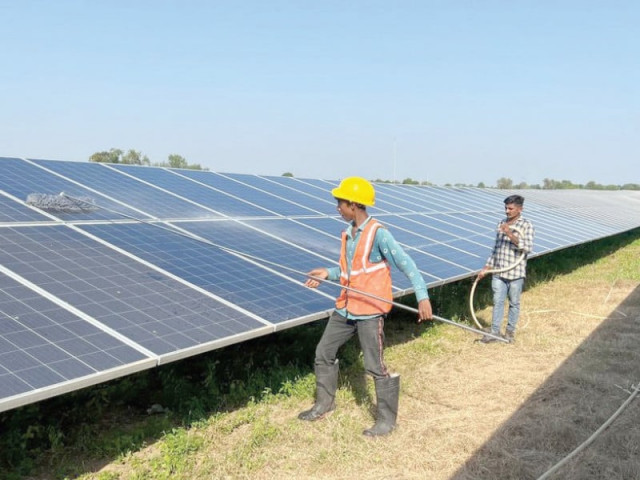Controversy over net metering financial rules
It is argued net metering subsidy goes to richer segment from low-income group

Net metering (solar photovoltaic – PV) is a hot topic these days having invited a lot of attention and even controversy. The government wants to change mostly the financial rules, while the net metering users would like to continue with the existing rules.
Undoubtedly, attractive incentives have been given in many countries for rooftop solar and have been gradually withdrawn as well.
There are problems as well as benefits of solar energy, especially the rooftop solar PV. Firstly, it is a green, non-polluting source; secondly, it brings in technology.
It is the rooftop solar which has made people aware, has expanded the economy and employment and has even fostered a class of technical people which has long-term consequences.
In the long run, grid dependence will be reduced and investment requirements will decrease, not only in transmission and distribution but also in generation.
There are problems being faced by distribution companies (DISCOs) as well as the government, which holds the purse. There are technical problems of overloading the distribution transformers and generation of bad electricity to put it in simple non-technical language; low power factor and harmonics, technically speaking. People take approval of smaller capacity but then add more capacity, etc.
However, the main issue is financial. The issue is that solar works during the day hours only. In that sense, it is an add-on capacity, making the existing grid capacity redundant.
In other words, additional grid and generation capacity has to be added. Solar does not relieve DISCOs of the responsibility to provide electricity to the net metering users called “prosumers” (producers + consumers).
This translates into an extra financial load on DISCOs as additional capacity charges, which finally reflects in higher average tariff or losses to DISCOs. This is interpreted as cross-subsidy to solar prosumers.
The problem magnifies socially, when it is argued that the net metering subsidy goes to the richer segment of society from the average or low-income group.
Net metering prosumers are normally the ones who have invested from Rs500,000 to Rs3-4 million. Certainly, they would be classed among the well-to-do, even if they hide behind loans, which are also given to the well-to-do, keeping in view the collateral, guarantees and other documentation requirements. Thus, there appears to be a case for reducing, if not, totally eliminating this subsidy.
However, there is a moral and quasi-legal issue as well, which can result in litigations by the prosumers. There is a kind of contract among the prosumers and DISCOs regarding the terms and conditions.
People have invested their money or borrowed capital based on such terms. Hence, any change in rules may have to keep in view this aspect.
Also, significantly reducing the incentives abruptly may affect the market and the economy. Traders have, reportedly, imported 5 gigawatts (GW) of solar panels and the associated equipment in the last six months alone. Any reduction in the solar market will send off negative ripples. In the construction industry, it is only the solar sector that is working.
However, it is only a few years after which solar prosumers would be facing the threat or uncertainty of reduction of incentives. Also, the issue of recouping capacity charges on the part of DISCOs would be gone significantly.
Why and how? It is because of the emergence of battery storage and the gradual price reduction of battery storage systems. Li-Ion batteries have been there for the last two decades or more but have become cheaper and affordable only recently, especially in the local market.
The trend is expected to continue. Keeping in view the emanating demand for storage, a number of local producers (assemblers) have emerged as well.
What the prosumer is doing is that he is using the DISCOs’ grid as storage. Once he installs the affordable batteries, he would not need the DISCO electricity, at least for the peak hours.
And the issue is of peak hours only. In the night hours, electricity demand, as such, is low, which does not cause the capacity problem. Thus, ways and means have to be found out to promote battery storage.
Keeping the aforementioned in perspective, one would like to recommend the following: 1-New rules and terms and conditions be applied to those who have completed installations for five years; 2-Attractive solar net metering tariff be maintained for prosumers of up to 10 kilowatts; 3-Less attractive tariff may be allowed to prosumers of 11-15 kW; 4-net metering be limited to 15 kW; 5-Net metering exports to grid be limited to 30% of the installed or generation capacity of the prosumer; 6-Those installing battery storage of four hours be awarded higher export tariff as afforded to 10 kW category; 7-Approval of net metering be awarded to consumers where the distribution transformer capacity exists, although it may give arbitrary powers to DISCO’s personnel and may open doors for corruption. All rules benefit those who enforce the rules. What can be done, otherwise?
The writer is the former member energy Planning Commission and author of several books on the energy sector
Published in The Express Tribune, May 20th, 2024.
Like Business on Facebook, follow @TribuneBiz on Twitter to stay informed and join in the conversation.



















COMMENTS
Comments are moderated and generally will be posted if they are on-topic and not abusive.
For more information, please see our Comments FAQ